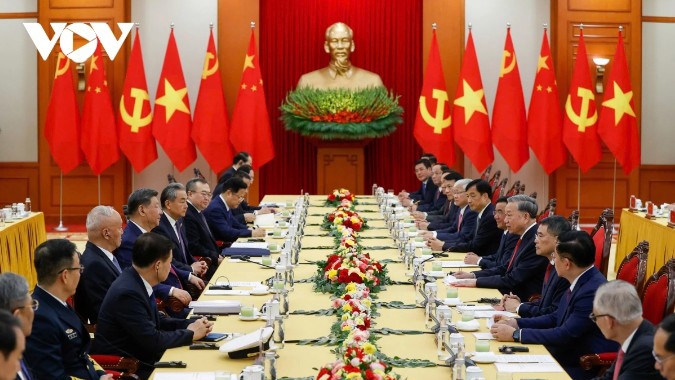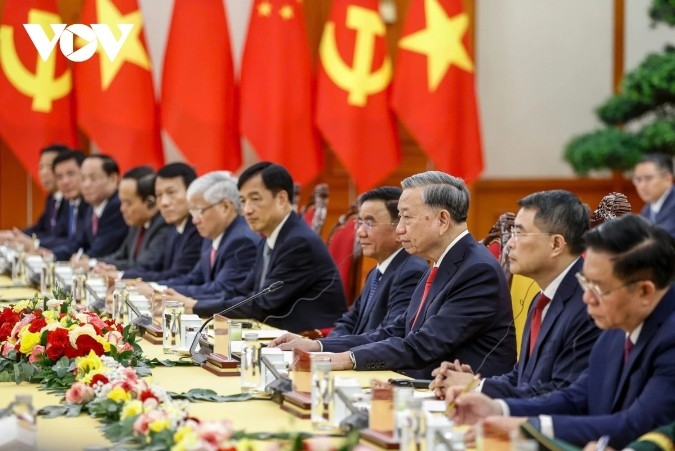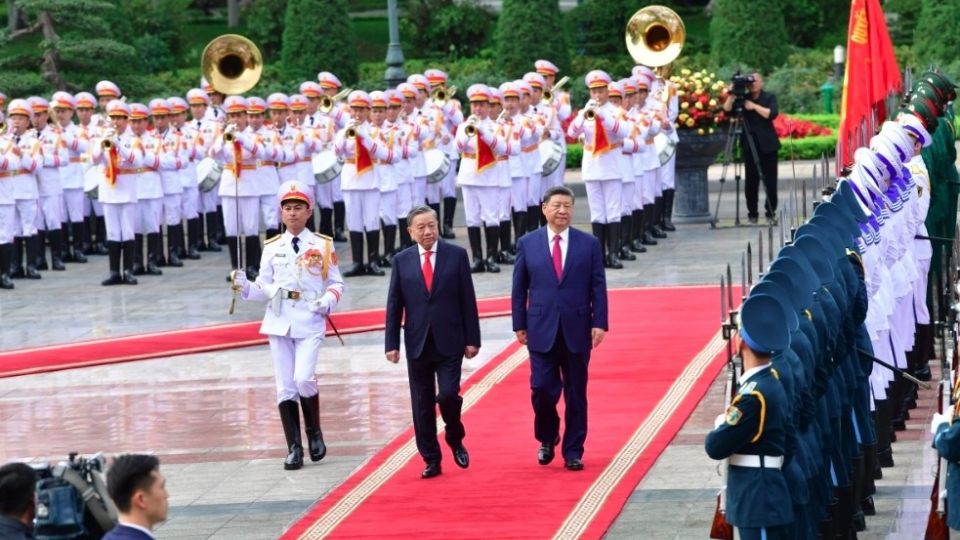Vietnam consistently regards China as top priority in its foreign policy
VOV.VN - The Party and State of Vietnam always consider developing relations with China an objective necessity, a strategic choice, and a top priority in its overall foreign policy.

Party General Secretary To Lam made the statement during his talks in Hanoi on April 14 with Party General Secretary and President of China Xi Jinping, who is leading a high-level Chinese delegation on a state visit to Vietnam, coinciding with the Year of Vietnam-China humanistic exchange and the 75th anniversary of both nations’ diplomatic relations.
He expressed his belief that the visit would mark a new milestone in the history of the friendly relations between the two Parties, countries, and peoples as a contribution to further deepening the comprehensive strategic cooperative partnership and promoting the building of a strategically significant Vietnam – China community with a shared future.
In response, the top Chinese leader affirmed his readiness, through this visit, to work with General Secretary To Lam and other key leaders of Vietnam to engage in in-depth discussions on orientations and measures to strengthen the traditional friendship, define a vision for building a China- Vietnam community with a shared future that holds strategic significance in line with six major orientations, move forward together with greater resolve, and make greater contributions to the global community.
Xi Jinping also spoke highly of the tremendous achievements and significant outcomes of the bold reform measures implemented by the Party and State of Vietnam in recent times. He expressed his belief that under the leadership of the Communist Party of Vietnam (CPV) Central Committee, headed by General Secretary To Lam, the Vietnamese people will surely fulfill the set goals and tasks, and confidently lead the country into a new era of development.

He affirmed that China remains committed to its policy of friendship with Vietnam, always regards Vietnam as a priority direction in its neighborhood diplomacy, and consistently supports the neighbouring country’s prosperous development and the well-being of its people.
In a warm, sincere, and candid atmosphere, the two leaders engaged in in-depth discussions on the situation of each Party and country, the relations between the two Parties and the two nations, as well as regional and international issues of mutual concern.
Regarding orientations for developing the relationship between the two Parties and two countries in the coming period, both sides agreed to maintain regular high-level exchanges, upgrade the Strategic Dialogue mechanism between the ministries of foreign affairs, defence, and public security to the ministerial level; ramp up practical cooperation in a multitude of fields, establish a Joint Railway Cooperation Committee between the two Governments to boost railway cooperation; organize well the activities of the Year of China-Vietnam Humanistic Exchange 2025, consolidating the social foundation; further strengthen multilateral coordination; and settle differences appropriately.
General Secretary To Lam proposed that both sides maintain regular strategic exchanges, enhance cooperation between the two Parties in key fields, especially foreign affairs, defence, and security; promote the connection of strategic transport infrastructure, offer the best preferential loans, technology transfer, and human resource training, making the utmost effort to ensure the progress of the Lao Cai-Hanoi-Hai Phong railway project. He also suggested that both sides advance digital transformation and scientific and technological cooperation as a new “bright spot” in Vietnam-China relations, step up cooperation in key technologies; intensify more balanced trade, higher-quality investment, focus on implementing major, emblematic projects in Vietnam, and help Hanoi and other big cities tackle air pollution.

He also hoped that both sides would solidify the social foundation, promote propaganda and education among the people, especially the younger generation, about the fine traditional friendship between Vietnam and China; organize a theoretical seminar between the two Parties this year; further augment cooperation in education, especially training high-quality human resources across a variety of fields, including fundamental sciences and new strategic sectors in high technology, to effectively serve the process of building a new quality production force, and and encourage more tourists to visit the other country.
Agreeing with and appreciating General Secretary To Lam's proposals, Xi Jinping suggested that both sides persist in deepening strategic trust, exchange experience in state governance, enrich socialist theory and practice, and firmly promote the socialist cause of both countries; effectively implement cooperation between the “Belt and Road Initiative” and the “Two Corridors, One Belt” framework; welcome more Vietnamese goods to be exported to the vast Chinese market, and encourage more Chinese businesses to invest in Vietnam; bolster cooperation in production and supply chains, expand collaboration in high-tech areas such as 5G, artificial intelligence, the Internet of Things, semiconductor chips, green development, and turn technological innovation into real productive force; carry out rich and diverse cultural exchanges, organize friendly exchanges, and better tell the story of the friendship between the two peoples. In the next three years, China invites Vietnamese youth to participate in the Red Journey to study the revolutionary history of the two countries.
On multilateral forum cooperation, Party chief To Lan and President Xi Jinping hoped that both sides would strengthen judicial cooperation and law enforcement within the framework of the Mekong-Lancang Cooperation.
The senior leaders of both sides consented to direct their agencies at all levels to actively seek effective methods and measures to appropriately resolve differences and promote cooperation consistent with the new level of Vietnam-China relations based on international law; strictly adhere to the consensus between ASEAN and China in implementing the DOC and work towards a substantive, effective COC in accordance with international law and the 1982 United Nations Convention on the Law of the Sea (UNCLOS).
After the talks, the two Party chiefs viewed and were introduced to 45 cooperation agreements across various fields signed between the departments, ministries, agencies, and localities of the two countries, showing the rich and comprehensive achievements that both sides have gained during this visit.
On the evening of the same day, General Secretary To Lam and President Luong Cuong hosted a grand banquet in honour of General Secretary and President Xi Jinping and his entourage.






